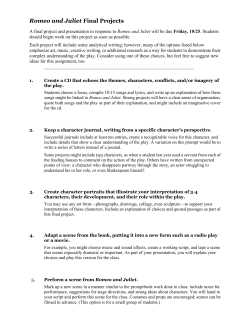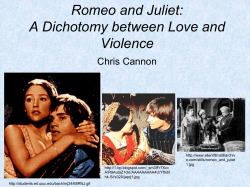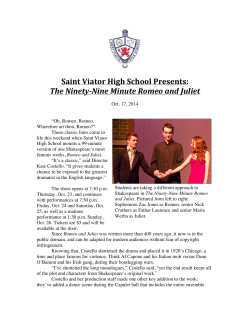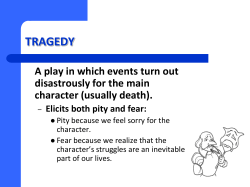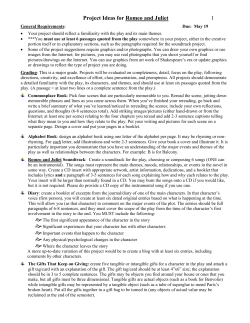
Before you start writing….. Steps One and Two
Before you start writing….. Steps One and Two Step One: Read and situate the passage within the text e.g. “This passage comes from act three, scene five.” Step Two: Identify the major themes evident within the passage. What aspect of the themes are explored? E.G. “The controlling, overwhelming power of fate is explored through Romeo’s mock resistance to his exile.” Before you start writing….. Step Three Step three: Reread and then write down at least four things you come to understand from reading this passage. For example: A important point or idea is revealed that develops the audience’s understanding of a theme Contrasting perspectives on a theme are presented through contrasting imagery, characters or actions A feature of a character’s disposition or personality is established or developed A character’s emotional state is explored A relationship between two characters is explored An important transition or transformation is taking place For example: In Act 3, Scene 5 Romeo is preparing to leave Juliet and escape to Mantua. The four things I come to understand from this passage are: Fate is omnipresent and overpowering within the passage: there seems to be no escape for the young lovers. Juliet is desperate to keep Romeo by her side and this blinds her to the dangerous reality of his situation for a brief period of time. Romeo humors Juliet by saying he will stay but there is a foreboding sense of black comedy in the subtext of his bold statements. By the end of the passage, both Romeo and Juliet seem painfully aware of the true dangers of their perilous situation. Before your begin writing…. Steps Four, Five and Six Step Four: Reread and annotate the script. Make sure you highlight: Key quotes that link to your four statements (you need atleast two quotes per point Figurative language e.g. metaphors, personification, similes, allusions Figures of speech e.g. apostrophe, hyperbole, puns, ambiguity Structural features e.g. rhyming couplets, sonnets, blank verse, split lines Sound devices e.g. rhyme, plosives, alliteration Step Five: Match quotes to your four bullet points. There should be a minimum of two quotes for each point. (Try not to repeat the same quote over and over.) Step Six: Organize your four points into the best order. Generally, it is best to start with a paragraph that discusses theme and then another that discusses character. Overall structure of a commentary (Look at the detailed slides after this for more information) Introductory paragraph Hook Summary of play Summary of passage Thesis Transition to body paragraphs Ideally four body paragraphs or more Clear opening point made about something you come to understand about the play because of the passage At least two quotes (Embed quote/ Identify language features/ Discuss meaning) Comment on how this might link to performance Concluding Paragraph Summarize the significance of the passage Explain the effects of the passage on the rest of the play Comment on the passage in performance End with a powerful statement that links to your original thesis Now start! Introductory paragraph C.S. Lewis, an English author, once wrote, “Affection is responsible for nine-tenths of whatever solid and durable happiness there is in our lives." This quotation suggests that affection, which often called love, is a desirable emotion yet William Shakespeare’s play, Romeo and Juliet, seems to contrast directly with this by suggesting that affection is also responsible for nine-tenths of the conflict and disappointments in life. The play centers upon the inevitable doom that surrounds two young lovers, Juliet and Romeo, from the moment they meet. Not only are their families, the Montague’s and the Capulet’s, embroiled in an “ancient grudge” but the stars seem to have fated their love to be fleeting and volatile. This passage from Romeo and Juliet is taken from act 3, scene 5. Romeo and Juliet have been just got married but Romeo is now banished for killing Tybalt, Juliet’s cousin, on his way home from the ceremony. This is the last time Romeo and Juliet are together alive. They discuss their love, whether or not day has descended and if it is time for Romeo to leave for Mantua. If Romeo is found in Verona he will be sentenced to death. In this scene love is shown to be blind; Romeo and Juliet’s love is a brutal and powerful emotion that imprisons them and catapults them directly towards a violent fate. Being desperately in love, Romeo and Juliet have been blind to the overwhelming dangers and “ill fated” nature of their relationship. Shakespeare uses mood, symbol, imagery, diction, and metaphor to show that when one is enveloped by love, the desire for another person can seem to outweigh the dangers but it also cautions that understanding the realities of a situation are needed if the love is to endure. Hook: Grab the reader’s attention with one of the following 1. Interesting Fact. 2. A telling quote, 3. A general statement about text OR topic. You must be able to link this to the play. Background: Give a brief summary of the larger work. Try to frame it with regards to the main theme or idea explored in the passage Summary of passage: •What act and scene does this passage come from? •What relevant plot details have led to this point? •Why is this passage significant to the play? •What are the characters speaking about? •What are the possible and real consequences of this passage? Thesis: A sentence that states your main arguments (3 minimum) about the aspects (theme, imagery, characterization, etc.) you intend to explore in your body paragraphs E.G. In this statement I link to the theme of the dangers of love, the them of overpower, controlling fate and I explore both character's emotional states. Transition to body paragraphs: Summarize language features and summarize overall understanding related to either a theme, purpose or message highlighted in the passage. Now write at least four body paragraphs (include a minimum of two quotes) Shakespeare portrays Juliet’s mood as desperate and so enraptured by Romeo that she is willing to overlook the dire consequences of him being found in the daylight in Verona. Juliet says, “It was the nightingale, and not the lark,/ That pierced the fearful hollow of thine ears.” The “nightingale” is a symbol for darkness, evening and life: as long as it is present, Romeo will live. It reveals that Juliet is so desperate to remain in Romeo’s arms that she is willing to lie to keep him by her side knowing full well the consequence, which would be Romeo’s death if he is found. Romeo, however, is fully aware of the time of day and reminds her of the consequences. Juliet’s mood then changes from desperately wanting to keep Romeo by her side to worry and concern if he is found. She says, “It is the lark that sings so out of tune,/ Straining harsh discords and unpleasing sharps.” Juliet’s negative perception creates an image of the disgruntled sounding lark because to her it has become a symbol for death. The lark is known to sing at dawn, which is when Romeo must leave her side. The fact that is now singing suggests Romeo should have already left; the chances of Romeo being discover and being executed for disobeying the Prince are now higher so to her this bird is all that is horrible in the world. Juliet’s fear not only shown by the lark but also her final question to Romeo. At the end of the passage she says, “O’ thinkest thou we shall ever meet again?” The dramatic irony of these words paints an image of the tragic ending that awaits the young lovers. Because of the prologue of the play explicitly stating the ending, the audience knows to well the answer and may feel helpless because grim fate is inevitable. If this were to be performed the actress portraying Juliet would need to be able to convey the character’s fluctuating moods by varying her tone of voice. At first it would be lighthearted with a sense of longing perhaps drawing out the lines because she desires to remain in Romeo’s company but by the end is the anxiety that Romeo will be discovered would bring more urgency to her lines. POINT: What do you come to understand by the end of the selected passage? Choose one of your four understandings from your preparation and create a clear opening sentence. EXAMPLE: •Make sure this is integrated into a sentence of your own •Use quotation marks •If your quote comes from two lines mark the end of a line with / LITERARY DEVICE &PURPOSE: •State a literary device that is evident within the quote •Describe the effect or purpose of the device •Sometimes support this by pulling out important words from the quote MEANING: •Explain what idea the quote and literary device help you understand about the passage TRANSITION STATEMENT: •Say something that links your first quote and analysis to you next one REPEAT PROCESS FOR EACH QUOTE! LINK TO PERFORMANCE: Make a statement about performance that links back to your point. •How would this look on stage? •What advice might the actor’s need? •How might actor’s need to develop or change during a passage? I.E. In this example, I mention Juliet’s mood in my point so I give advice that links to this in my concluding sentence. Concluding paragraph This is just a suggested list of things to discuss. You can be creative here but you still need to demonstrate you ability to synthesize all your ideas into concise summary, make personal and wider connections to and/ or inferences about the text. You also need to connect back to your original thesis. In conclusion, this passage is significant because it emphasizes the overwhelming and inescapable power of fate. The young lovers try in vain to defy the “star-crossed” nature of their love but by the end of the passage they are forced to face the reality that their love is dangerous and if Romeo does decide to “defy” his stars again, it can be inferred that his actions will only result in more violence. The momentum of the falling action speeds up from this moment on and propels all characters towards the final catastrophe: the double suicide of the young lovers. This passage is particularly powerful because the heavy dramatic irony encourages a sense of helplessness in the audience and much empathy for the lovers’ short-lived and unrealized personal desires. Watching the play, the audience would surely feel the conflicting desires of both young lovers. In the play Romeo and Juliet, there seems to be no room for the fulfillment of personal desires: fate is already written, perhaps by family desires or perhaps by the a greater guiding force in the stars, but certainly not by the individual. The only personal influence an individual has have over their fate seems to be people can influence their fate is to make it come more quickly and aggressively. Make a statement that summarizes the overall significance in terms of theme, message or purpose. Summarize the main way in which this is communicated. Make a connection to the place in play where this passage falls and explain the effects of it on the rest of the play. Make a statement about the effects of the passage on the audience. Imagine what it might feel like to watch this scene and try to point out the thing that might be the most affecting/ interesting/ exciting to observe. End with a powerful statement which links back to your thesis in your introduction.
© Copyright 2025
